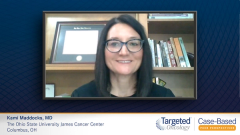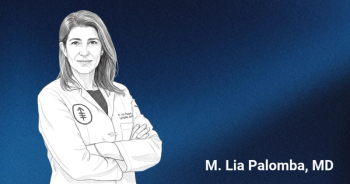
Considerations for Maintenance Therapy in Follicular Lymphoma
Kami Maddocks, MD, explains the factors surrounding when and why a physician may choose to introduce maintenance therapy for a patient with follicular lymphoma.
Episodes in this series

Kami Maddocks, MD: Maintenance therapy in follicular lymphoma [FL] has been studied after combination chemoimmunotherapy with R [rituximab]-CHOP [cyclophosphamide, doxorubicin hydrochloride (hydroxydaunorubicin), vincristine sulfate (oncovin), and prednisone] and with R-CVP [rituximab, cyclophosphamide, vincristine sulfate, prednisone] and maintenance rituximab was shown to prolong progression-free survival [PFS], although not overall survival [OS] after this treatment. When you look at it with bendamustine based therapy, it’s not specifically been studied on its own BR compared with BR with rituximab maintenance, although we do know that studies have shown retrospectively reviewing that patients with BR that achieve a complete remission by PET [positron emission tomography] scan, do not seem to benefit from maintenance therapy, but though they achieve a PR to treatment with BR, do seem to benefit from rituximab maintenance.
In patients where you use obinutuzumab based therapy, this has only been studied with maintenance therapy and so it is recommended, although we know when the trial was evaluated, bendamustine plus or minus rituximab versus obinutuzumab, that there was increased cytopenias and increased infections reported in the study, which is felt to potentially be based on the benda [bendamustine] induction therapy, but also brings into question if maintenance after bendamustine can lead to an increased risk of infections.
In my practice, I don’t usually use rituximab maintenance, especially because I use bendamustine as my first-line treatment in most patients. There is more data again to support its use of R-CHOP based therapy, although this is all in prolonging PFS and not OS.
Transcript edited for clarity.
Case: A 74-Year-Old Man With Relapsed/Refractory Follicular Lymphoma
Initial presentation
- A 74-year-old man complains of a 6-month history of fatigue, occasional fevers, decreased appetite, fatigue, and an 8-lb weight loss
- PMH: unremarkable
- PE: palpable right axillary and cervical lymph nodes, palpable ~ 3 cm in both locations; spleen palpable 4.5 cm below left costal margin
Clinical Workup
- Labs: ANC 1.6 x 109/L, WBC 11.2 x 109/L, 44% lymphocytes, Hb 9.6 g/dL, plt 98 x 109/L, LDH 315 U/L, B2M 3.5 µg/mL; HBV negative
- Excisional biopsy of the axillary lymph node on IHC showed CD 20+, CD 3+, CD5+, CD 10+, BCL2+; follicular lymphoma grade 2
- Bone marrow biopsy showed paratrabecular lymphoid aggregates, 4% involvement
- Molecular genetics: t(14;18) (q32;q21)
- PET/CT showed enlargement of right axillary, cervical, and mediastinal lymphadenopathy (3.3 cm, 3.1, cm and 4.6 cm respectively)
- Ann Arbor Stage IV; ECOG 0
Treatment
- He was treated with R-CHOP for 6 cycles, achieved complete response and continued rituximab maintenance
- 24 months later he complained of increasing weight loss, fever and drenching sweats as well as more enduring fatigue and new onset itching; he was currently taking antibiotics for his 3rd bacterial infection in the past year
- Repeat PET/CT revealed progression of disease
- He was started on bendamustine + rituximab for 6 cycles and continued on rituximab maintenance
- Repeat lymph node biopsy grade 2 follicular lymphoma
- 12 months later he complained of continued weight loss, increased itching and worsening fatigue; recurrent infections continued
- He was started on idelalisib 150 mg PO BID



















